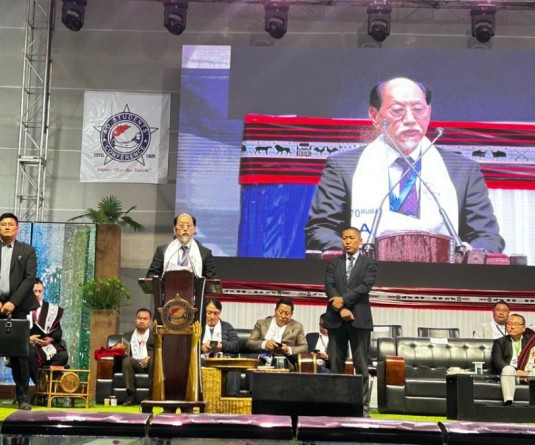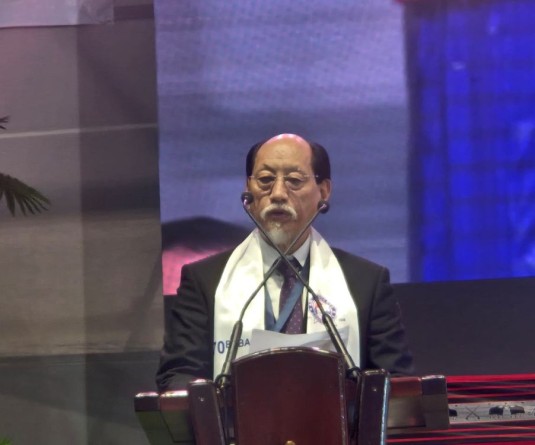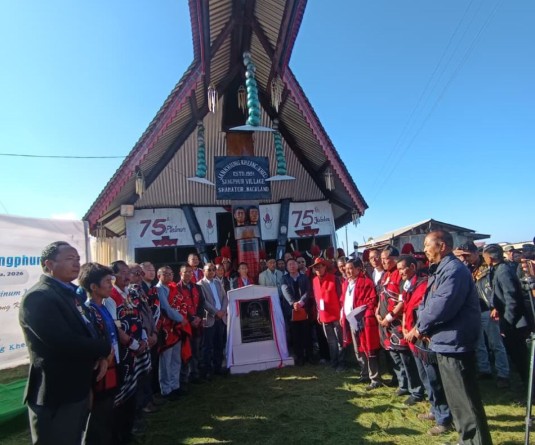Performers relish Ao Naga delicacies served in environmental friendly leaves at Ao Community Morung during Hornbill Festival at Naga Heritage Village, Kisama on December 4. (DIPR File Photo)

Says ‘Waste Not, Celebrate More’ approach paves the way for sustainability!
New Delhi, December 11 (MExN): The 25th Hornbill Festival in Nagaland, celebrated as the “Festival of Festivals,” has taken a significant step towards sustainability this year by going ‘Zero-Waste and Single-Use Plastic (SUP)-Free,’ the Union Ministry of Housing & Urban Affairs (MoHUA) stated on Wednesday.
Known for showcasing Nagaland’s rich culture, music, and traditions, the festival is setting a powerful example in eco-friendly event management. The 25th edition paves the way for sustainability with the ‘Waste Not, Celebrate More’ approach, the MoHUA highlighted in a statement.
The ten-day festival is held annually from December 1-10.

According to the MoHUA, the festival aligned with global sustainability goals and aimed to become a benchmark for eco-friendly events in India. To this end, rigorous waste management practices and community engagement were implemented, harmonizing cultural celebrations with environmental conservation.
Several impactful measures were adopted to make the festival a ‘Zero-Waste and SUP-Free event,’ the MoHUA added. All single-use plastics, including straws, disposable plates, cups, and plastic bags, were banned in an effort to reduce environmental impact. Vendors were required to use sustainable alternatives such as bamboo straws, biodegradable cutlery, leaf-based plates, and paper bags, the MoHUA maintained.
To ensure the success of this initiative, dedicated enforcement teams and volunteers actively monitored the venue for compliance, it said. Educational signage and awareness campaigns were also in place to encourage visitors to make eco-conscious choices, further reinforcing the commitment to sustainability.
Additionally, the MoHUA noted that a comprehensive waste management system was established, starting with waste segregation at the source and processing the waste with either recycling or on-site composting units.
To reduce waste further, food stalls used reusable or compostable utensils like banana leaves and bagasse-based plates, while visitors were encouraged to bring their own utensils or purchase reusable ones at the venue.
The MoHUA also highlighted the use of water refilling stations across the festival site to discourage the use of plastic bottles, while incentivizing visitors to bring their own reusable bottles, with refillable options available for purchase.
In addition, 42 toilets were installed at the Hornbill Festival, with 36 located in the Morung (food area) and 6 at public locations. These toilets were regularly cleaned and maintained throughout the event, the MoHUA added. IEC (Information, Education, and Communication) campaigns also played a crucial role in promoting sustainable behavior at the festival.
Impact
According to the MoHUA statement, the Hornbill Festival's zero-waste approach has led to significant environmental impacts, most notably the reduction of SUP waste.
Approximately 1 lakh SUP items were prevented from being used each day, totaling around 1 million fewer items over the 10-day festival. By eliminating SUP usage, the festival likely avoided over 50 metric tons of CO₂ emissions, contributing to a decrease in its carbon footprint, it said. Local sourcing of eco-friendly materials further reduced transportation-related emissions, and by preventing plastic waste, the festival helped mitigate the release of methane and ethylene, potent greenhouse gases.
This initiative aligned with global climate goals and helped improve air quality in Nagaland, the MoHUA said. The festival also promoted a circular economy by implementing sorting stations and encouraging recycling, with recyclable materials such as paper, glass, and metals being sent to authorized centers, ensuring resource conservation and reduced energy consumption.
The MoHUA further asserted that the zero-waste initiative in Nagaland could serve as a model for large-scale events worldwide.
This initiative is not only a major achievement for Nagaland but also a shining example for the global community in the fight against climate change and plastic pollution, it added.
However, the MoHUA statement put the daily footfall at over 2 lakh visitors, though this figure represented the total attendance over the 10 days, as per stateistics provided by the Nagaland Tourism Department.






